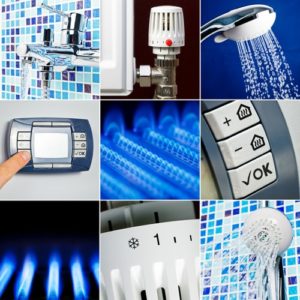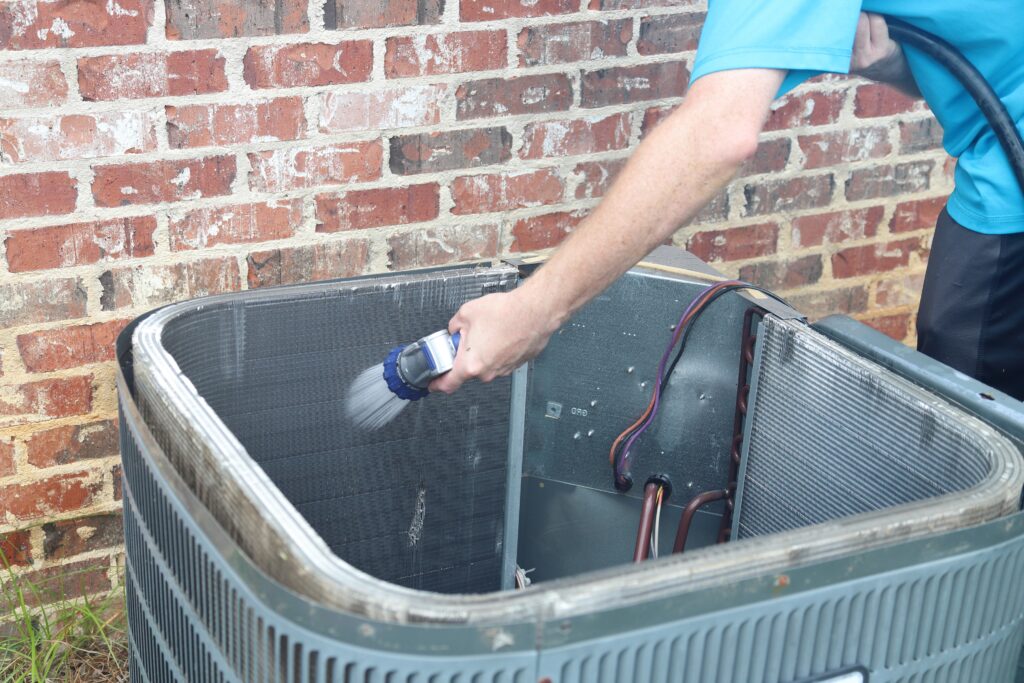
Water heaters today are not your mother’s water heater of yesteryear. There is much to consider when it’s time to replace your old water heater. Blue Frost Heating & Cooling can help you choose the best one for your family’s needs.
A water heater is another one of those modern gadgets you cannot imagine life without – until you are without it. There’s nothing quite like a cold shower to quickly renew a deep appreciation for water heaters!
Water Heaters Have Come a Long Way, Baby!
Water heaters today are not your mother’s water heater of yesteryear. We now have the best of both worlds. Single hot water tanks today have advanced quite nicely in three ways:
- They put out more water than two older tanks combined
- Keep the water hot while not in use (working, sleeping, away from the house, etc.)
- And they cost half of what you would normally pay to keep the water hot
How Do You Know When It’s Time to Buy a New Water Heater?
Water heaters come with various warranty time frames. If yours has a 10-year warranty, and it’s been giving you hot water faithfully for thirteen, consider purchasing a new one ASAP! If your home is supplied with hard water, your water heater will probably need to be replaced before its warranty is up. Hard water is tough on good ol’ water heaters.
Top Things to Consider When It’s Time
When looking for a water heater for your home, you should consider these four things:
- The fuel type will affect the water heater’s annual operation costs, size, and energy-efficiency.
- You need a properly sized water heater to provide your household with enough hot water and to maximize efficiency.
- Know how energy-efficient a water heater is before you purchase it. An energy-efficient water heater will maximize your energy and save you money.
- Before you purchase a water heater, it’s good to estimate how much it will cost you to operate it each year. Then compare this estimation with other models that may be less or more energy-efficient.
What Should You Look For in a Water Heater When It’s Time?
The answer to this question really depends on how much hot water your family uses and how the water is being heated.
If your family of four, let’s say, takes several showers, runs the dishwasher and washes a couple loads of laundry, you could be using a total of about 100+ gallons of hot water on an average day. That doesn’t mean your family will need a 100-gallon water heater though.
The first-hour rating (FHR) or gallons-per-minute (GPM) of a water heater tells you how much hot water it can deliver during its first hour of use. What is the first-hour rating (FHR) for the storage-tank water heater you have or want to purchase? What is the gallons-per-minute rating (GPM) for the tankless water heater you may be considering?
When that is figured out, you must determine how quickly you’re using up the hot water and when the water either becomes cool or even cold. How long does it take the water heater to return to its full FHR? Is there such a thing as too much hot water? YES, but only when you are storing it, not when you are using it. Call Blue Frost Heating & Cooling at 630-444-0860. We help you calculate the water heater capacity you need.
Water Heater Types Explained
There are several types to choose from:
- Storage tank
- Tankless (also known as on-demand)
- Heat pump (hybrid)
- Solar
- Condensing
Storage Tank
- is most common
- has an insulated tank
- heats and stores water until needed
- draws hot water from a pipe on top
- has a temperature and pressure-relief valve, which opens if either exceeds the level you set it for
Natural gas water heaters are usually more energy-efficient and cost less to run than electric water heaters. Gas models cost about 50 percent less to run but cost more when you purchase them.
Tankless (On-Demand)
- does not store water
- uses heating coils to heat the water as needed
- is more energy-efficient than a storage tank
- provides only about 3.5 gallons of hot water per minute
- is best for people who don’t use hot water all at once, like running a shower and dishwasher at the same time
Tankless water heaters work best for homes that use natural gas to heat the water. Electric models are available but might require an upgrade of your home’s electrical capacity. That’ll cost you a pretty penny to do. On-demand water heaters don’t hold or store water like a storage tank water heater does unless they have an auxiliary tank. They supply you with continuous hot water unless multiple sources are drawing hot water all at once, for example, a shower and the dishwasher. If this happens often, you may want to consider purchasing two tankless units. Have New Tankless Water Heaters Improved?
Heat Pump (Hybrid)
- captures heat from the air and transfer it to the water
- needs up to 1,000 cubic feet of uncooled space to capture enough heat from the air
- needs a nearby drain to discharge the condensate
- uses about 60 percent less energy than standard electric water heaters
- costs more than electric-only models but payback time is short
- doesn’t work well in very cold spaces
- needs to be installed in an area that stays 40 to 90 degrees
- needs as much as 7-feet clearance from floor to ceiling because the heat pump is on top
Solar
- sun’s heat is absorbed by a cell mounted on the roof
- sun’s heat is transferred to an antifreeze-like fluid
- closed-loop system runs the hot antifreeze-like fluid to the water tank
Great solar water heaters save tons of money in summer sun. This makes them ideal for hot and sunny places. But if you live where it’s cold and cloudy often, you won’t see much in the way of savings. Most models come with a backup system for cold or cloudy days.
The return on investment for solar water heaters isn’t very attractive either. Federal and local rebates are available for solar water heaters, but it could take you ten to thirty years to recoup what you’ll spend buying and installing a solar system.
Condensing
If you heat with gas and need more than a 55-gallon water heater, condensing water heaters are an option for your family.
- look like conventional water heaters
- differ from conventional water heaters in that they capture exhaust gases that would normally go out the flue
- captured gases are blown through a coil in the base of the water heater where cold water enters the unit and absorbs most of the heat
Visit Energy Saver 101: Water Heating infographic.
Note: Be prepared. You may need to spend more up front for a model that will save you money in the long run. If a water heater claims to cut energy costs by up to half of what a regular storage model does, be sure to weigh the initial investment costs against the amount of time it will take to get the return on your investment.
Another note: Reducing hot water use and using drain-water heat recovery can help you save money on your water heating bill.
Your Water Heater Options by Fuel Type
Fuel type and its availability determine your water heater choices.
- Electricity
- Fuel oil
- Geothermal energy
- Natural gas
- Propane
- Solar energy
There are new efficiency standards for water heaters that can boost efficiency and cut your monthly utility costs by twenty-five to fifty percent, too. That can amount to a lot of savings since twenty percent of your home’s energy costs are spent on heating water for your home!
Water heaters today come with more insulation and more improvements for efficiency. Our Blue Frost Heating & Cooling professionals can help you understand all of today’s energy-efficient regulations and new efficiency standards, and whether or not your new water heater will fit in the place your old one did. We’ll even help you with your homework. Feel free to give us a call at 630-444-0860.
Other Considerations When Looking for the Right Water Heater for Your Family
- Warranty: Most water heaters come with a warranty for 3 to 12 years. Longer-warranty models cost more, but they tend to have larger elements or burners that speed up water heating. They also tend to have thicker insulation for less heat loss. Blue Frost Heating & Cooling recommends choosing a water heater with the longest warranty available.
- Anti-Scale Devices: Mineral scale that builds up at the bottom of a water heater tank can shorten the life of the tank’s heating element. However, we recommend choosing a water heater with a 12-year warranty that comes with a longer, thicker element. We don’t think you need to pay for any fancy features.
- Brass Drain Valves: Drain valves are located near the base of the water heater for draining the heater. Make sure the water heater’s drain valve is brass. A brass drain valve is more durable than a plastic one.
- Glass Lining: Glass lining will reduce corrosion of the tank.
- Digital Displays: Digital displays allow you to monitor levels and customize how the water tank operates. Think vacation mode here. Some electric and heat pump hybrids come with a setting that uses just the heat pump while you’re away. Solar water heaters display temperatures of the water in the tank and collector, pressure readings and more.
Blue Frost Heating & Cooling is Here to Help You With All Your Water Heater Homework
Because of the many new choices available today as well as many more energy-efficient regulations, it’s super important that you do your homework on water heaters. Call Blue Frost Heating & Cooling at 630-444-0860 for information on every type of water heater. We’ll help you determine the capacity needed and how long it takes for a water heater to return to its full FHR.
Some water heaters are wider and or taller. This means your new water heater may not fit in the place your old one did. We’ll help you with that, too.
Don’t worry. Be happy! Give us call today!
Blue Frost Heating & Cooling
Professional and Certified
Cooling, Plumbing, Heating
Your leader in home comfort and customer service for 25 years
Conveniently located at
416 E. Wilson Street in Batavia and
at the corner of Route 25 and Route 64 (North Ave) in St. Charles






